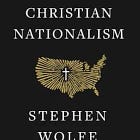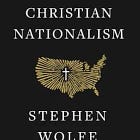The Case for Christian Nationalism
8. The Right to Revolution | IV. Conditions for Revolution (Part 2)
Previously:
[Our spiritual forefathers] were not habitually trained to retreat to universality, to justify all their claims of public life by making the other the chief beneficiary or to make the object of policy all people without discrimination.1
The mask slips a little further off of Wolfe with this statement; he explicitly calls people in disagreement with his system of religion and government “the other” and admits his would be a state of proactive discrimination. “The other” he refers to is not just the non-religious or practitioners of false religion, but anyone who is not onboard with a paedobaptist state-church and theocratic Caesarism, even should they be devoted Protestant Christians. Many true disciples of Jesus Christ would find themselves with the proverbial boot on their neck, under such a government.
Following this, he moves to naming and attacking the common enemy of all forms of right-wing authoritarian-nationalism (most especially fascism), what he calls “totalizing liberal regimes”.2 He incorrectly identifies the watering down of the faith as a recent, secularist tactic when, in reality, J. Gresham Machen decried this phenomena over a century ago in his book, Christianity and Liberalism. There will always be an antinomian pressure put upon Christians by the world; to use it as an excuse for extreme, political measures is a point of broken eschatology. Wolfe’s claim of a “retreat to universality”, and his statement that, under liberalism, “Every square inch is secularist, unless granted by an exception by the state,” is no different in principle than Primo de Rivera’s view that, “Liberalism is, on one hand, the regime without faith, the regime that hands over everything, even the essentials of the country’s destiny, to free discussion.”3 The only significant difference between Wolfe’s view on liberalism and that of Primo de Rivera is that the former overtly attempts to utilize a Reformed “Christian heritage” as an excuse for crushing classical liberals who would dissent from his authoritarian ends.
The regime also works to channel religion to support it. This is evident in the rise of what I call the “regime evangelical” - the evangelical arm of the ruling class that Christianizes regime narratives and talking points, feigning as insiders in the evangelical camp in order to shape Christian godliness and “witness” from within.4
Wolfe makes the very valid point that there is often an attempt from government interests to co-opt the church. In 20th century communist nations this was far more overt than in the capitalist West; as shown with Popov, secret police would arrest pastors as traitors and replace them with men loyal to the party, who would preach communist propaganda from the pulpit. In the United States, there has long been an open door for Democratic politicians to promote their political agenda at theologically liberal churches and, slightly less frequently, for Republicans to do the same at conservative churches. A newer phenomenon has emerged recently, where formerly staunch conservatives have inched their way towards promoting socially liberal policies and now lambaste the conservative church as being too fundamentalist for doing nothing more than holding to the same, traditional doctrine that the critic used to promote himself. No two people have become the targets of conservative ire, along these lines, more than Russell Moore and David French.
Despite the truth of Wolfe’s statement, there is an incredible irony within it. The core purpose of his book is to define a regime that pushes and enforces a particular, Christianized narrative. His complaint constitutes a genetic logical fallacy, in that he implicitly expects the reader to consider his “Christianized regime narrative” better than his opponents’, though he will not exegete to make that case.
His next claim that, “Christian Americans should see themselves as under a sort of occupation,” is true, but only in that this is the case for every Christian who has ever lived. Christ sits at the right hand of God (Hebrews 10:12), who is enthroned over all His creation, but we live in a world that still has a “god” in Satan (2 Corinthians 4:4). This world is not the Christian’s home, and we will, in some sense, be perpetually under occupation until we are with Christ. It is fine to lament this, but to advocate for the violent overthrow of a “ruling class” that one sees as “hostile to your Christian town, to your Christian people, and to your Christian heritage”5 is wholly antithetical to the message of the New Testament. That Wolfe can advocate for such, without secret police kicking in his door and dragging him away, proves that he is not living under the type of oppressive regime he attempts to describe the United States as.
Next:
Stephen Wolfe, The Case for Christian Nationalism (Moscow, Idaho: Canon Press, 2022), 342.
Ibid., 342-343.
Nick W. Sinan Greger, Jose Antonio Primo de Rivera: The Foundations of the Spanish Phalanx (o.A: Independently published, 2018), 85.
Stephen Wolfe, 343.
Ibid., 344.



